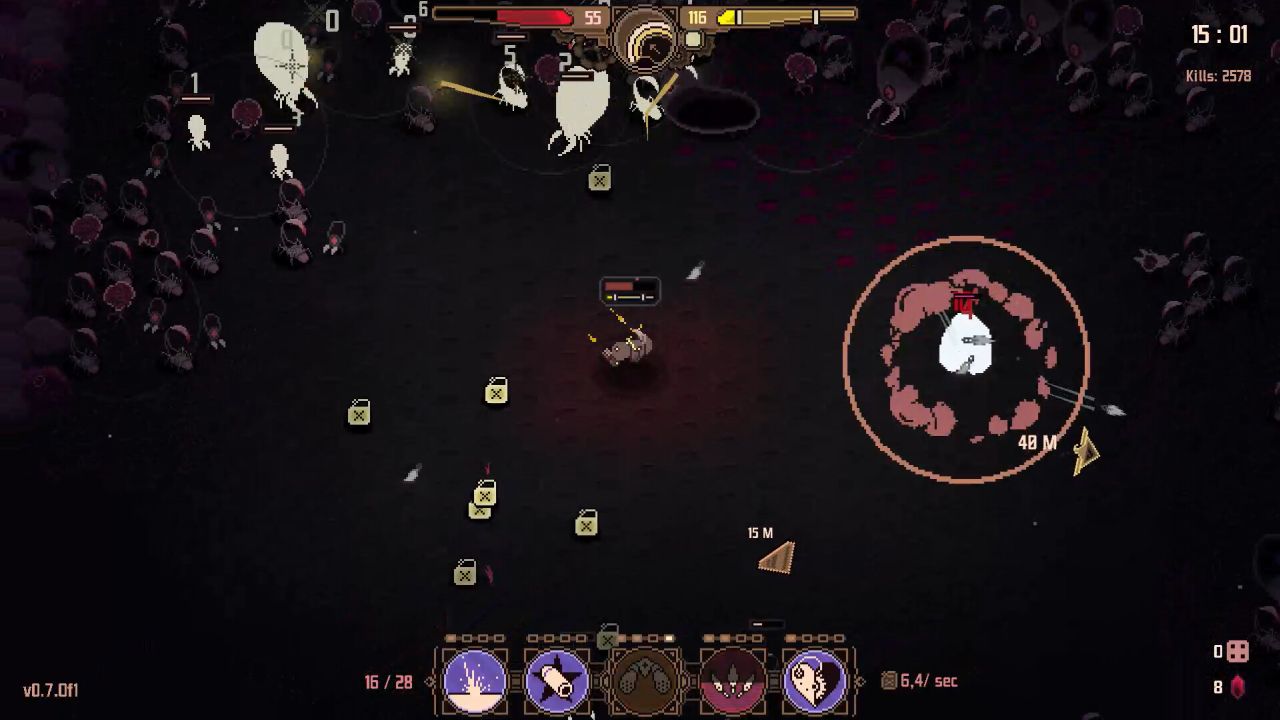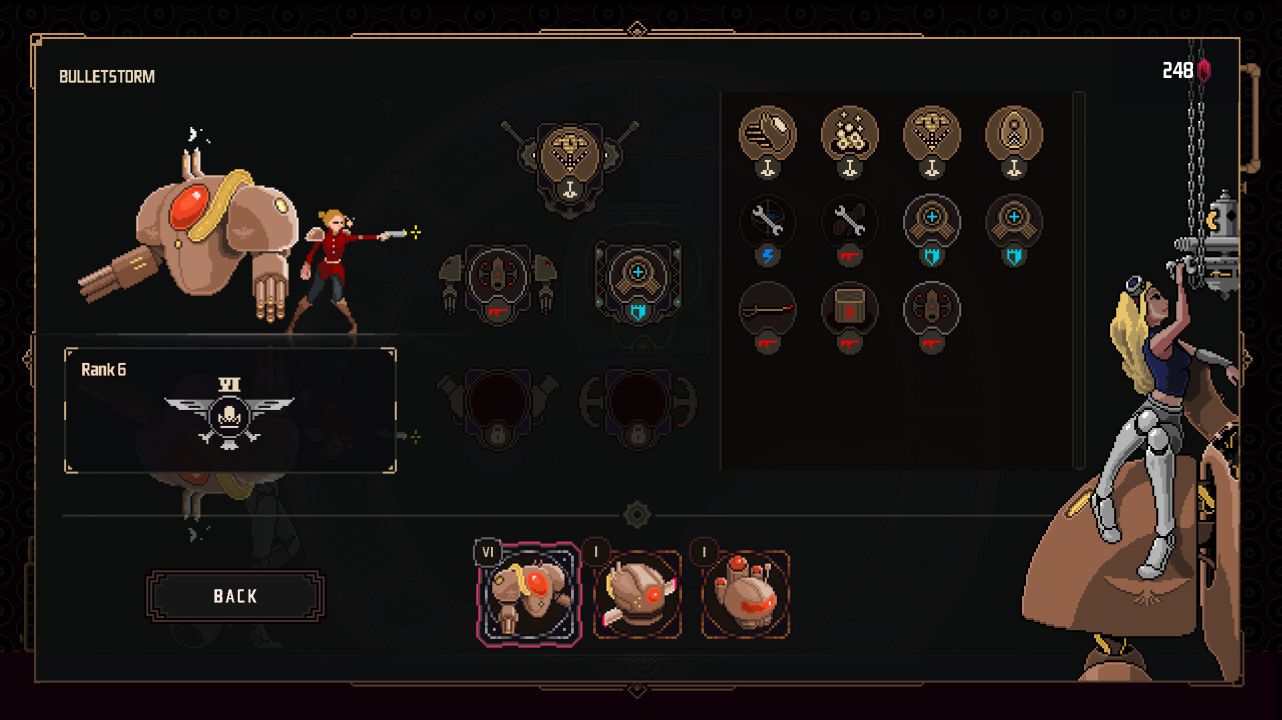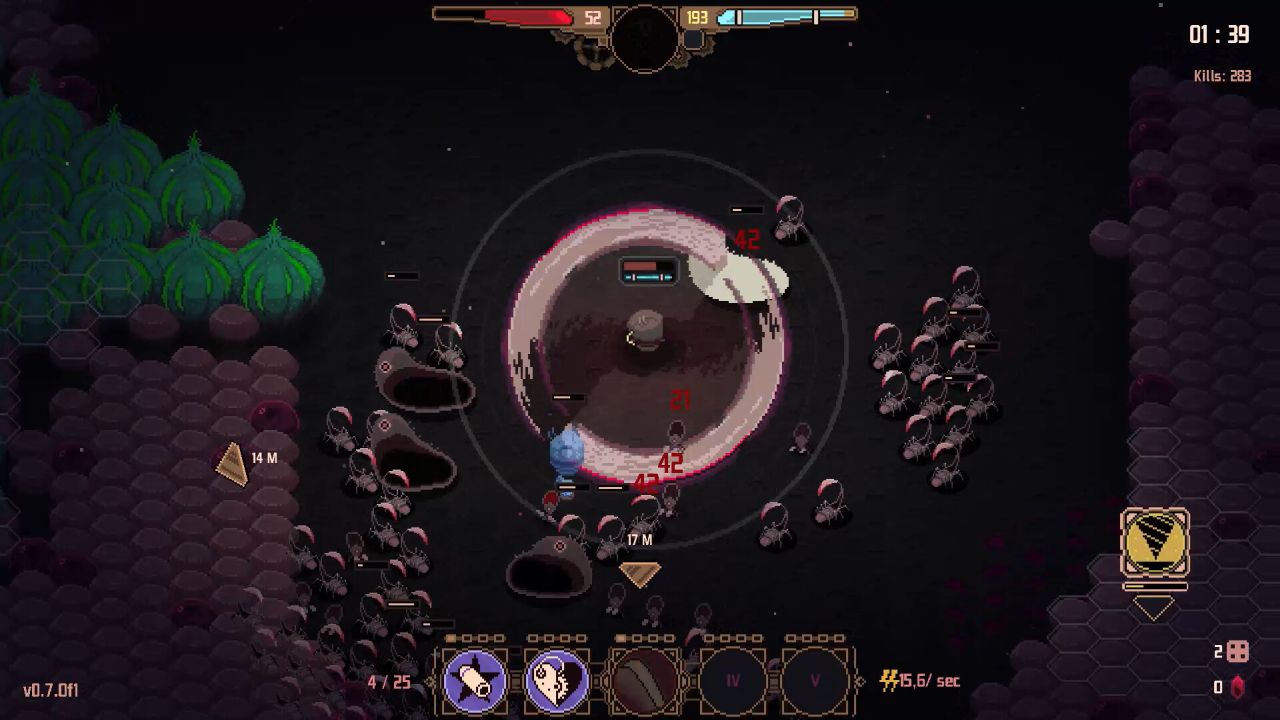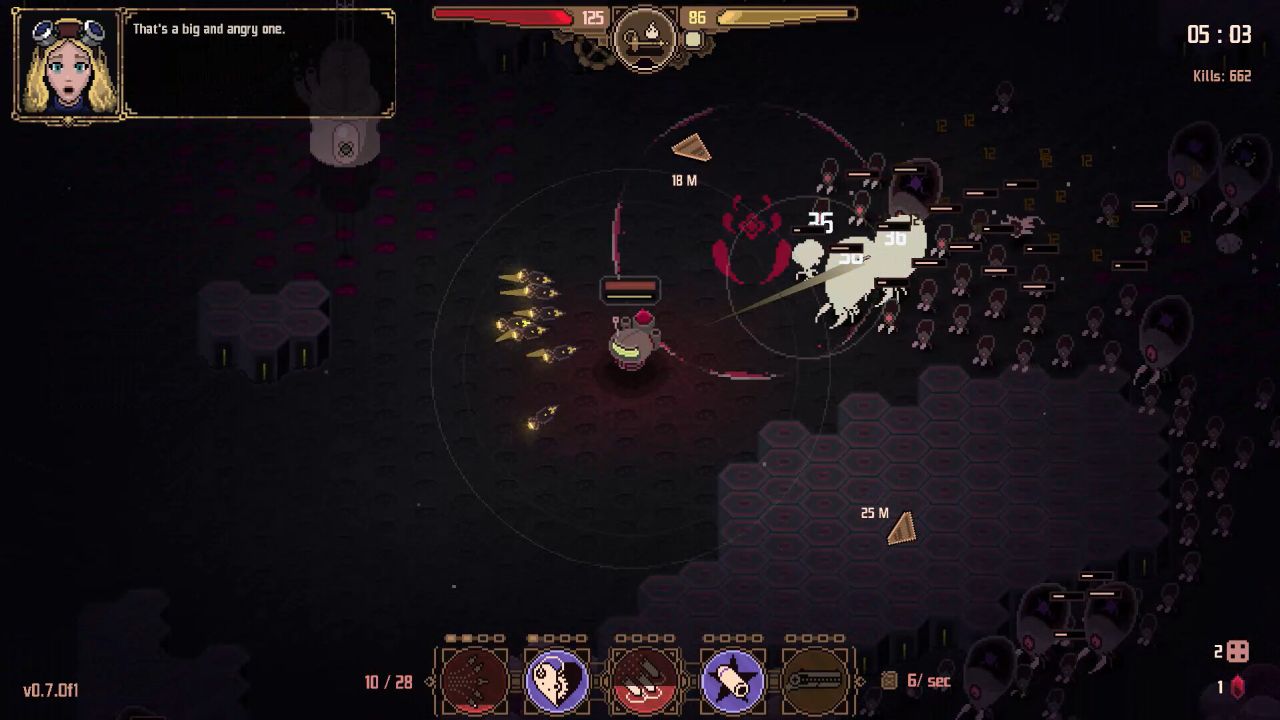Swarm Grinder Review
If the original Alien movie taught us anything, it’s that when exploring an alien planet you should steer well clear of anything that looks like an egg. Swarm Grinder—an action roguelite game in the style of Vampire Survivors—ignores this lesson entirely, throwing you into an egg-infested underground cavern to merrily hunt for upgrades as bug-like aliens spring to life on all sides and try to tear you apart with their razor sharp mandibles.

For those unfamiliar with this genre, the goal is to survive as long as possible against increasing hordes of enemies while your weapons fire automatically, with a 2D top-down perspective. Without the need to manually aim and shoot, the focus is entirely on where to move and which upgrades to select. Sometimes called ‘reverse bullet hell’ or ‘bullet heaven’ shooters, there has been a flurry of such games lately, all eager to capitalise on the meteoric success of Vampire Survivors.
To its credit, Swarm Grinder makes some smart tweaks to the formula that help it stand out from the swarm of similar titles. You play as the pilot of a mech tasked with collecting upgrade parts and bioshards from an abandoned mine on an alien planet. The mine is filled with a mixture of grey rocks and dark red eggs, and your mech is surrounded by a circle which removes rocks and hatches eggs as you move. This may not sound like much, but it changes the feel of the game significantly, giving you a measure of control over the spawn rate of enemies. Also, instead of gaining currency or experience from killing mobs, your only way to increase power is to follow arrows that point to the nearest upgrade, which can be claimed by clearing a small zone around them. You have five available slots to populate with a mixture of active weapons and passive bonuses, which can then be upgraded several times each. It’s a simple but satisfying gameplay loop.
Each of the three available mechs focuses on one of the three main attacks: bullets, blades, and explosions. The upgrades themselves are also focussed on buffing these attacks, or on upgrading your core stats like health or attack speed. There’s also a fuel gauge to worry about which will slowly decrease over time and can be refilled by grabbing fuel power ups that frequently drop from alien bugs you’ve squished. The rate at which you lose fuel is also increased by certain upgrades.

The result of these mechanics is a bullet heaven game where you feel more in control of the frantic action… but only slightly. The density of eggs will increase over time, as will the ferocity of the nasties bursting out of them. I must say, I like the creature designs here. Some have pulsing bloodshot eyes, and the way they swarm in formations around you like a shoal of deadly fish is creepy as hell. Although you can’t afford to stay in one place too long—like in all bullet heaven games, you’re in a constant arms race with the enemies—I like that you can choose to avoid hatching new eggs if you’re at risk of being overwhelmed. And make no mistake: the bugs will constantly try to overwhelm you and cut off your escape routes. Every few minutes a timer counts down to zero, at which point the music will crank up as a vast cloud of bugs hatch and swarm towards you (shudder).
My first half dozen playthroughs were a blast. The game has a nice flow to it, building to a crescendo every few minutes as the timer counts down. Your ability to control the rate at which new enemies spawn means you always feel you have a chance even if you’re down to your last sliver of health. The bosses that appear at the end of each run are fun to take down, if not especially challenging or mechanically nuanced. I had a good time fighting an octopus-like monster that chased me around the screen with detachable tentacles.
Each successful run opens up a new level of difficulty from the options menu. By the third difficulty level I found myself struggling to contain the alien mobs. This is where the game’s roguelite progression comes into play—and where the problems start. There’s a chunky menu of permanent upgrades in various categories that can be paid for with bioshards that you find within levels, and which are awarded at the end of a run. The upgrades are all fairly straightforward boons—increased health or fuel regeneration, bonuses to the different damage types, increased movement speed, etc. The problem is that the upgrades are fairly expensive and increase in price the more you purchase in each category, so working through the upgrade tree feels like a slog.

You might be thinking: hang on, the word ‘grind’ is right there in the game’s title! What were you expecting? And yes, at first I was happy to throw myself into the grind, particularly as the moment-to-moment gameplay is pretty good, and different in flavour to other similar games I’ve played. But for the grind to be rewarding there needs to be enough variety to keep me engaged, and there simply wasn’t.
There are three different levels and three playable characters. You can equip one gadget which allows you to perform a special move like a dodge roll or the ability to leave a trail of poison where you walk. Like the bioshard upgrades, it takes longer than I would like to unlock these options, but more importantly, they don’t shake up the gameplay enough when they finally arrive.
The best games in this genre are intensely, purposefully repetitive, yet they constantly shower you with little extras—new levels, weapons, playable characters—that tweak the gameplay enough to keep it fresh and maintain a sense of onward progress. In Swarm Grinder, you’ll use the same three characters on the same three maps to unlock and upgrade the same small roster of weapons over and over. There are some interesting synergies to be found between different weapons and passive abilities, but most of the time your best strategy is to pick a single damage type and try to buff it as much as possible. It’s a shame, as the foundation here feels solid, and the pixel graphics and music combine to give the game a unique style.

It’s also worth mentioning that I encountered noticeable stuttering on several occasions towards the end of runs when I was mobbed by a large number of enemies. Given the relatively simple pixel graphics on display here, this was especially surprising and disappointing.
But at least the pixel visual style looks great: there’s a grungy, lo-fi look to everything, dominated by browns, greys and dark red. Your mech appears old fashioned and almost cute, like a robot from an Isaac Asimov story who should be helping you clean your house but has instead picked up an assault rifle. The visuals are matched by a thrashy, aggressive soundtrack that builds in intensity with the action.
At £6.99/$7.99, Swarm Grinder is actually more expensive than many other bullet heaven games, which more typically retail around the £3.99/$4.99 mark. But for fans who can’t get enough of this type of game, there may be enough value here to warrant a purchase at that price. For the rest of us, I’d advise waiting for a sale.
